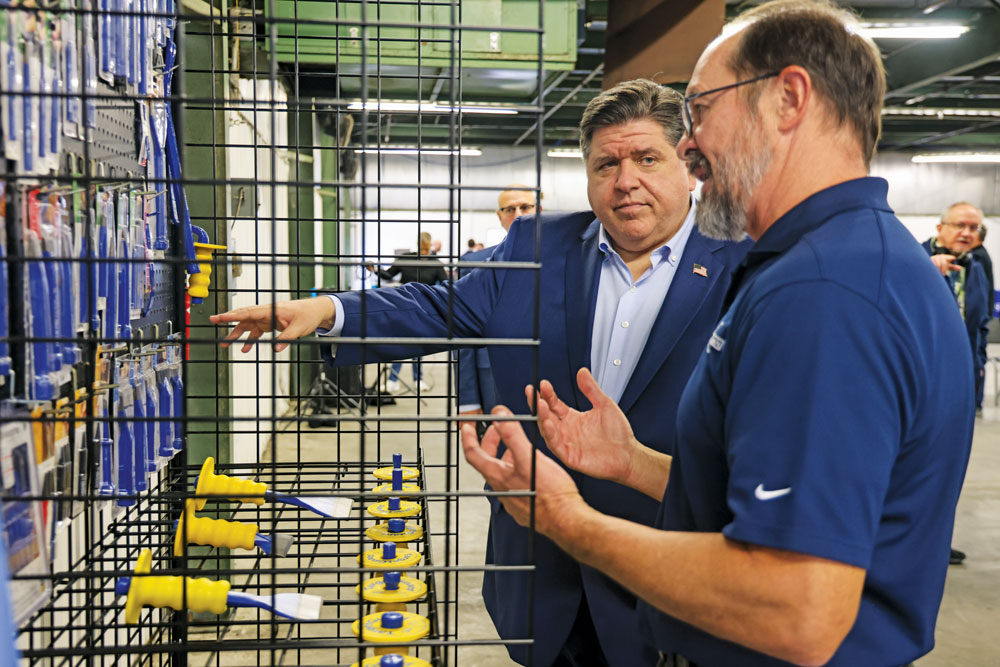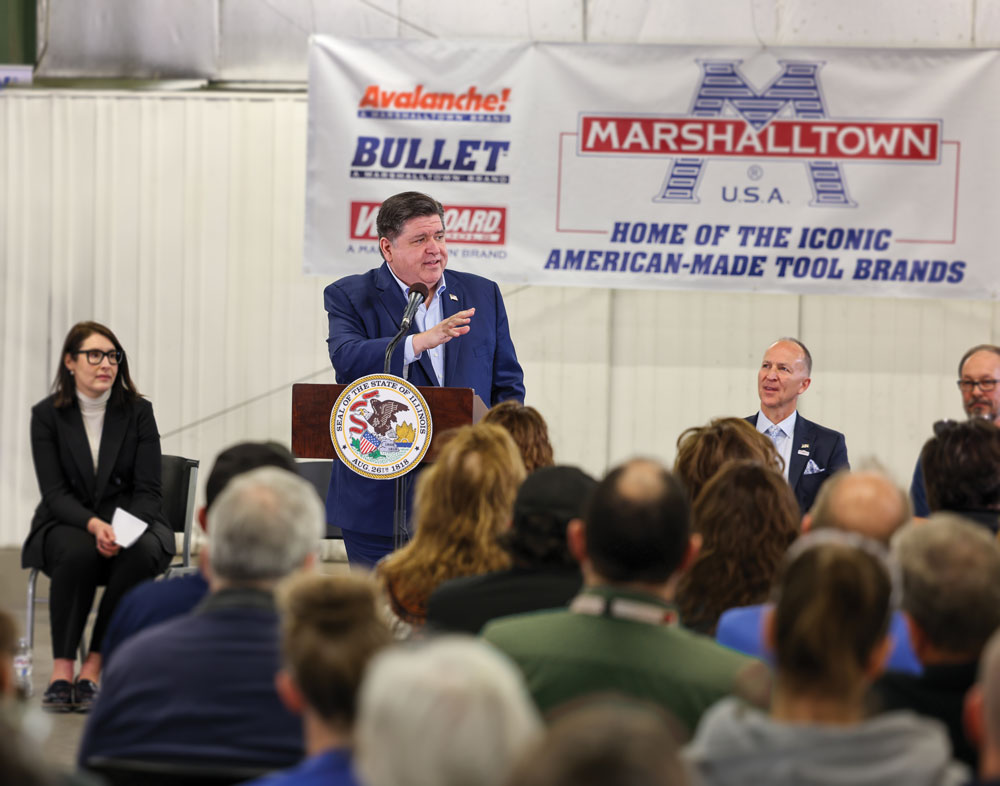Remembering ‘Forgottonia’: How a ‘Heart and Soul American’ Tool Manufacturer and Town Were Saved
When you’re a 155-year-old company, all it takes is a 135-year-old company to inject some vitality into the proceedings.
That and some help from your friends.
In April 2024, prospects for hand tool manufacturer Vaughan & Bushnell and its 120 employees looked as dim as the company’s long-ago roots, which trace back to 1869 in Chicago and eventually a major manufacturing plant located in Bushnell, Illinois, a town of fewer than 2,700 people located not far from the railroad town of Galesburg (home to Knox College) and the city of Macomb (home to Western Illinois University). “Macomb is not that big either,” says Robin Wilt, who just finished serving two terms as Bushnell’s mayor, “not Peoria-sized by any means.”
Bushnell sits in the heart of a 16-county region of west-central Illinois that WIU student Neal Gamm in the 1960s branded “Forgottonia” because of perceived infrastructure neglect.
“It was a tremendous thing to be a part of. We couldn’t have done it without the State of Illinois stepping in and helping the way they did.”
— Robin Wilt, Bushnell native and former mayor
Declaring himself the governor, Gamm and his fellow activists/satirists attracted national attention (and eventually the desired attention of transportation officials) with the elaborate scenario, complete with a run-down building as capitol and a plan to secede, “go to war” with the United States, immediately give up and then petition for foreign aid.
The official Forgottonia state bird? The albatross. State flower? The forget-me-not. Official flag? The white flag of surrender.
Wilt, the first female mayor of Bushnell in its 160-year history, was in no mood to surrender in 2024. Sure, there are other employers around: Midwest Control Products, a maker of tubes, spring pins, spherical rod ends, ball joints and other products; a grain grinding operation from ADM; grain bin maker Bushnell Tank Company. But nothing drove the economy like the pounding of the hammer plant, where Vaughan & Bushnell also made prybars, handsaws and axes.
A Bushnell native whose parents used to operate a gas station next to the plant, Wilt spoke to me on a July day when the sun was so hot the corn was sweating. But that’s nothing compared to the heat in the factory. “It’s a million degrees in there,” she says. “It’s an old plant, heart and soul American. It’s loud. I grew up falling asleep hearing the hammers drop,” along with the 100 trains a day that used to pass through town.

Gov. Pritzker visits with Marshalltown Hammer Plant Manager Mike Havens.
Wilt ran for mayor on a citizen’s ticket. “I didn’t declare Republican or Democrat because it’s not about politics for me,” she says. “It’s about the people.” It’s also about unseen things like infrastructure.
“I learned more about the sewer system than I ever wanted to know,” she says. “It gave me a purposeful way of governing. We have to put so much money into that infrastructure we never see, but it sustains our village.”
So does an employer such as Vaughan & Bushnell, whose operation Wilt describes as a “vital organ” to the town, where more than 80 of its employees lived.
“I was in the thick of it all,” she says of the plant’s teetering fortunes. It was a situation that truly put the community in a position of survival, she says, “that I hope we don’t see again.”
Rollercoaster Ride
Privately owned since the beginning, Vaughan and Bushnell kept things close to the vest, but everyone had an aunt, uncle or parent who worked there. Word got around that business was down. After the city loaned the company money but things were still looking bad, the family called the city looking for further assistance. “We were blindsided,” Wilt says. “We didn’t know things were so bad. We had town meetings to find out what our community thought.”
Within six weeks of the red alert, executives from tool company Marshalltown, based about a four-hour drive away in Marshalltown, Iowa, since 1890, were among the suitors on the ground in Bushnell evaluating whether they could make the acquisition. By May 2024, the answer was yes, which came as a huge relief to employees and town alike. Just as quickly, however, the devil in the details reared his head and the deal was off.
Suddenly all those jobs were on the chopping block again. Plant closure appeared imminent. Some employees went ahead and retired.
On closer inspection, however, there was still a heartbeat. One of the negotiators was about to head off on a long-planned vacation and Wilt found herself stopping at truck stops to do interviews during a drive down to Texas to see her kids.
“It was pretty frantic,” Wilt recalls. “We buckled down. That’s when the State of Illinois stepped in and said, ‘We have some grant money that can help you out. This is how you qualify for it.’ They spun it so fast. It was heaven sent, you could say.”
Kim Pierce, president and CEO of Macomb Area Economic Development Corporation, “was a tremendous asset throughout the entire process,” Wilt says. “She was a key figure in making sure of the I’s we had to dot and T’s we had to cross.”
So was Salvador Garza of the Illinois Department of Commerce and Economic Opportunity (DCEO). Consequently, Gov. JB Pritzker himself came to town on November 20, 2024, to announced that the state would provide a $5 million grant to enable the acquisition by Marshalltown. Marshalltown Hammer has committed to retaining at least 100 full-time jobs at its Bushnell facility, investing in updating manufacturing equipment and rebuilding the inventory needed to continue to manufacture tools at this site.
“Today, we are shining light on a century-old legacy in Bushnell — American-made tools manufactured right here by generations of Illinoisans have built the places and spaces where we work, live and play,” DCEO Director Kristin Richards said at the ceremony. “Marshalltown Hammer’s success story is a true testament to what it means for government to work with our economic development and corporate partners and do what we do best: Invest in a sector that is key to Illinois’ economy, and invest in our neighbors, who call Western Illinois home.”
Back in Business
Thirty years working with student health insurance at WIU had given Wilts an inkling of the speed to expect from any government when it came to getting requests approved. But the Marshalltown deal was different.
“I’ve never seen government move so quickly as it did,” she says. “It was a tremendous thing to be a part of. We couldn’t have done it without the State of Illinois stepping in and helping the way they did.”
“Today, we are shining light on a century-old legacy in Bushnell — American-made tools manufactured right here by generations of Illinoisans have built the places and spaces where we work, live and play.”
— Kristin Richards, Illinois DCEO Director, at the November 2024 announcement of the Marshalltown Hammer investment
The state was not the only helping hand: The City of Bushnell owns and operates its own utilities, so offered a $500,000 concession on utility bills if Marshalltown employs a certain number of people. “That’s a lot of money for us little people to be giving up, but it was saving 120 jobs and the future of the community, so it had to happen,” Wilt says.
Like small towns scattered across Illinois, Bushnell knows that even in a place where the major employer goes back six generations, this is no time to look back.
As of July 2025, the community swimming pool’s splash pad was about to hold its grand opening. The refurbished Bushnell Train Depot continued to host events. And Marshalltown Hammer was looking to fill five open positions.

